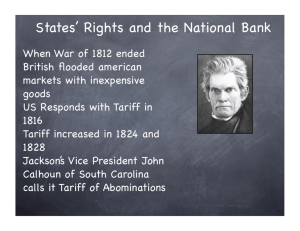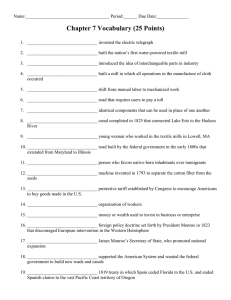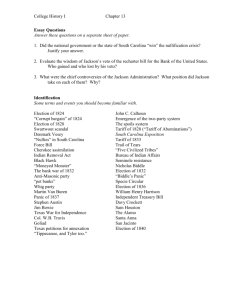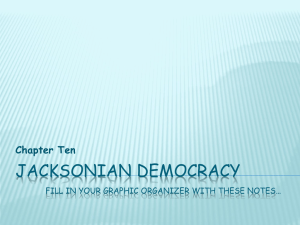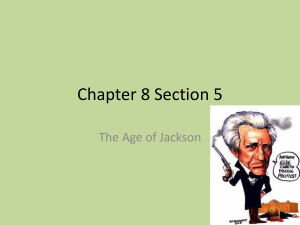7.4 States' Rights & the National Bank
advertisement
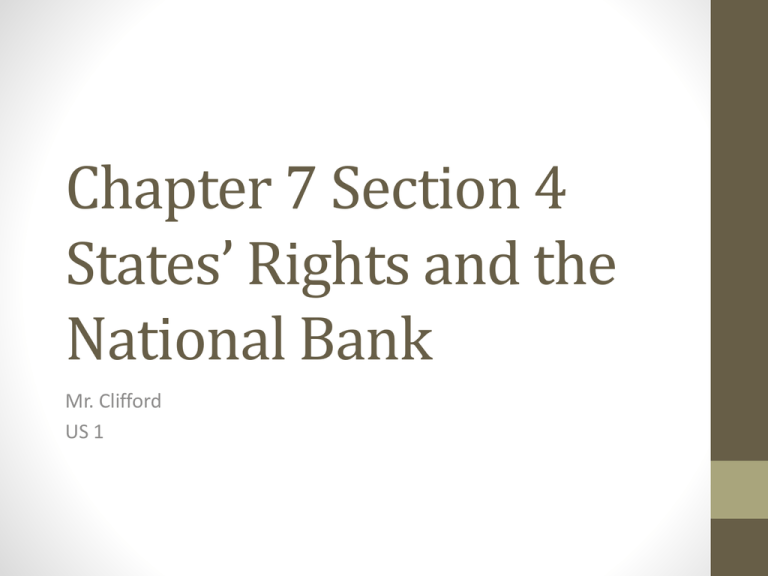
Chapter 7 Section 4 States’ Rights and the National Bank Mr. Clifford US 1 Main Idea & Why It Matters • Main Idea • Andrew Jackson confronted two important issues during his presidency: states’ rights & national bank. • Why It Matters Now • Conflict over states’ rights and federal government control continues to flare up in such arenas as education, commerce, and law enforcement. 7.4 Key Terms • Daniel Webster • John C. Calhoun • Tariff of Abominations • Bank of the United States • Whig Party • Martin Van Buren • Panic of 1837 • William Henry Harrison • John Tyler Tariff Raises the States’ Rights Issue • British manufacturers flooded the US market with inexpensive goods in an attempt to destroy their competition in the Northeast United States. • 1816: Congress passed a tariff to protect American industries. • The tariff would be increased in 1824 & 1828. 1828: Tariff of Abominations “When Southerners see the flourishing villages of New England they cry, ‘We pay for all this!’” • 1828: Tariff of Abominations • John C. Calhoun coined the Tariff of 1828 the Tariff of Abominations. High tariffs on British manufactured goods resulted in: • Reduced British exports to the United States • Forced southern planters to buy expensive manufacture goods from the northeastern United States. • South believed that the North was getting rich at the expense of the South. Questions • 1.) Why did Britain lower the price of their manufactured goods after the War of 1812? • 2.) Why did Congress place a tariff on imports from Great Britain? • 3.) Why were American manufactured goods more expensive then British goods? • 4.) Did Southerners have a legitimate argument? Calhoun’s Nullification Theory • Calhoun argued that the US Constitution was established by 13 SOVEREIGN STATES. • Each SOVEREIGN STATE had the right to nullify/reject a federal law that it considered ‘UNCONSTITUTIONAL’. • Calhoun: If federal government refused to allow a state to nullify a federal law, then that sovereign state had the right to withdraw from the Union. Hayne & Webster Debate States’ Rights Daniel Webster oSenator from Massachusetts oBelieved that preserving the Union was more important than ensuring liberty. oWebster did not support the Nullification Theory oCondemned Calhoun/Hayne’s stance on state’s rights Robert Hayne oSenator from South Carolina oBelieved the federal government were trampling on the rights of sovereign states. oHayne & Calhoun supported the right of states to do what they felt were best for their state. oSupported ‘nullification’. UNION vs. LIBERTY President Andrew Jackson: “Our Union: it must be preserved!” • Vice President John C. Calhoun: “The Union, next to our liberty, the most dear; may we all remember that it can only be preserved by respecting the rights of the States and distributing equally the benefit and burden of the Union. South Carolina Rebels • 1832: US Congress passes tariff law • South Carolina legislators • declare tariffs of 1828 & 1832 “null, void, and no law” • South Carolina threatens to secede from Union if US customs officials tried to collect duties. South Carolina Rebels (continued) • President Andrew Jackson • Declares South Carolina’s actions treasonous • Threatens to hang VP Calhoun and march federal troops into South Carolina to enforce the tariff. • Persuades Congress to pass: • Force Bill: allows federal government to use army & navy against South Carolina if state authorities resisted paying proper dues. Henry Clay The Great Compromiser • Henry Clay • 1833: proposes a tariff bill that would ‘gradually’ lower tariff duties over a ten-year period. • Crisis between South Carolina and federal authorities was averted. • Tariff issue would continue to cause conflict and would be a major cause of the Civil War. Jackson Attacks the National Bank • Henry Clay & Daniel Webster developed a bill to re-charter the Bank of the US. • Jackson and his supporters campaigned against the bank calling it a ‘privileged institution’. • Bank of US had an unfair advantage over state & private banks (all Federal tax revenues were deposited into Bank) • B.U.S. stockholders earned interest from deposits • Only a privileged few were profiting from Bank of US • 1832: Jackson vetoes bill to recharter the Bank of the United States. Pet Banks • “The bank, Mr. Van Buren, is trying to kill me, but I will kill it.” President Andrew Jackson 1832 • The Bank’s charter would run out in 1836. Jackson’s goal was to kill the bank before it’s charter ran out. • Jackson appointed a Secretary of Treasury who was willing to place all government funds in certain state banks. (a.k.a. Jackson’s pet banks) Biddle tries to save Bank of United States • Nicholas Biddle tried to save the Bank by: • demanding repayment of loans • refusing to issue loans • Biddle believed that a frustrated public would demand that Jackson recharter the Bank. • Businessmen pleaded with Jackson for help but Jackson blamed Nicholas Biddle. • Pressure from financial leaders forced Biddle to adopt a more generous loan policy. • When the charter expired in 1836, the 2nd Bank of the United States became just another Philadelphia Bank. Whig Party Forms • Jackson’s tactics angered many people including members of his own Democratic Party. • 1834: Henry Clay, John Quincy Adams, & Daniel Webster formed the Whig Party • Whig Party supported: • The American System • Build infrastructure to foster trade between regions. • Federal control of banking system. Van Buren Deals with Jackson’s Legacy • Jackson’s Vice President Martin Van Buren easily won the 1836 Presidential Election. • In 1837, Jackson’s Pet Banks began printing bank notes in WILD excess of the gold/silver they had on deposit. (BANKS WERE PRINTING MORE CURRENCY THEN THEY HAD) • Because of this, many banks stopped accepting paper currency and would only accept gold/silver. Panic of 1837 • Banks closed • Credit system collapsed • People lost their savings • Hundreds of businesses went bankrupt • 1/3 of population were out of work Tippecanoe & Tyler, too • Whigs won the Presidential Election of 1841 • President William Henry Harrison (Tippecanoe) • John Tyler (southern democrat who supported states’ rights) • Harrison would die 1 month into his presidency • Tyler took over and enacted antiWhig policies.
